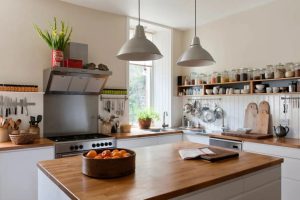 Butcher block countertops have long been a staple in kitchens, celebrated for their unique blend of functionality and aesthetic appeal. These surfaces, crafted from bonded wooden strips, offer a warm, inviting atmosphere that can enhance any kitchen design. Whether you’re a culinary enthusiast or simply looking to upgrade your kitchen, understanding the ins and outs of butcher block countertops is essential. This comprehensive guide will delve into various aspects of butcher block countertops, including their benefits, maintenance, installation, and more.
Butcher block countertops have long been a staple in kitchens, celebrated for their unique blend of functionality and aesthetic appeal. These surfaces, crafted from bonded wooden strips, offer a warm, inviting atmosphere that can enhance any kitchen design. Whether you’re a culinary enthusiast or simply looking to upgrade your kitchen, understanding the ins and outs of butcher block countertops is essential. This comprehensive guide will delve into various aspects of butcher block countertops, including their benefits, maintenance, installation, and more.
What Are Butcher Block Countertops?
Butcher block countertops are constructed from thick strips of hardwood that are glued together to form a solid surface. Originally designed for butchers to chop meat, these countertops have evolved into a popular choice for residential kitchens. They are available in various wood species, including maple, oak, walnut, and cherry, each offering distinct characteristics and visual appeal.
Types of Butcher Block Construction
-
- Edge Grain: This is the most common type of butcher block. It consists of long strips of wood arranged with the edge facing up, providing a smooth and durable surface.
- End Grain: This construction method involves cutting the wood into small blocks and arranging them so that the ends are visible. This style is highly durable and resistant to knife marks, making it ideal for heavy-duty use.
- Face Grain: In this style, the flat surface of the wood is exposed. While it offers a beautiful appearance, it is less durable than edge or end grain options.
Popular Wood Species
-
- Maple: Known for its light color and fine grain, maple is a popular choice for a clean, classic look.
- Walnut: This wood features rich, dark tones and a striking grain pattern, adding elegance to any kitchen.
- Oak: Available in red and white varieties, oak is known for its strength and distinctive grain.
- Cherry: Cherry wood deepens in color over time, providing a warm, inviting atmosphere.
Benefits of Butcher Block Countertops
Butcher block countertops offer numerous advantages that make them a favored choice among homeowners.
Aesthetic Appeal
The natural beauty of wood adds warmth and character to any kitchen. Each piece of butcher block is unique, showcasing the natural variations in grain and color. This uniqueness can complement various design styles, from rustic to modern.
Versatility
Butcher block countertops can be used in various applications, including kitchen islands, bar tops, and even bathroom vanities. Their adaptability makes them suitable for both residential and commercial settings.
Cost-Effectiveness
Compared to other countertop materials like granite or quartz, butcher block is often more affordable. The price can vary based on the wood species and construction style, but it generally falls within a reasonable range.
Eco-Friendly Option
When sourced responsibly, butcher block countertops can be an environmentally friendly choice. Many manufacturers offer sustainably harvested wood options, contributing to a lower carbon footprint.
Maintenance and Care
While butcher block countertops are durable, they do require regular maintenance to keep them looking their best.
Cleaning
To clean butcher block surfaces, use a mild soap and warm water. Avoid harsh chemicals that can damage the wood. For deeper cleaning, a mixture of vinegar and water can be effective. Always dry the surface thoroughly to prevent moisture absorption.
Oiling
Regularly applying food-safe mineral oil helps to protect the wood and maintain its appearance. It is recommended to oil the surface every few weeks, especially in high-use areas. This process prevents the wood from drying out and cracking.
Repairing Scratches
Minor scratches and dents can be sanded out using fine-grit sandpaper. After sanding, reapply mineral oil to restore the surface’s finish. This ability to repair makes butcher block a sustainable choice, as it can be rejuvenated rather than replaced.
Installation Process
Installing butcher block countertops can be a DIY project or handled by professionals, depending on your skill level and the complexity of the installation.
Professional Installation is Highly Suggested
Professionals have the experience and tools necessary to ensure a precise fit and can handle any unexpected challenges during installation. The process typically involves:
-
- Acclimating the Wood: Allow the butcher block to adjust to the kitchen’s humidity and temperature for several days.
- Measuring and Cutting: Carefully measure the space and cut the wood to fit.
- Sanding: Smooth all edges and surfaces to ensure a polished finish.
- Attaching: Secure the countertop to the cabinets using adhesive or screws.
- Finishing: Apply the chosen oil or finish to protect the surface.
Cost Considerations
The cost of butcher block countertops can vary widely based on several factors, including the type of wood, construction style, and installation method.
Price Range
-
- Basic Options: For more affordable woods like pine or birch, prices can start as low as $25 per square foot.
- Mid-Range Choices: Maple and oak typically range from $40 to $80 per square foot.
- Premium Selections: Exotic woods like walnut or cherry can cost between $80 and $150 per square foot.
Additional Costs
Keep in mind that installation costs can add to the overall price. If you opt for professional installation, expect to pay an additional fee based on the complexity of the project.
Pros and Cons of Butcher Block Countertops
Like any material, butcher block countertops come with their own set of advantages and disadvantages.
Pros
-
- Durability: When properly maintained, butcher block can last for decades.
- Repairable: Scratches and dents can be easily sanded out, extending the life of the countertop.
- Warmth: The natural wood adds a cozy feel to the kitchen.
- Versatile Design: Available in various wood species and styles, butcher block can fit any aesthetic.
Cons
-
- Maintenance: Regular oiling and cleaning are necessary to keep the wood in good condition.
- Susceptible to Damage: Wood can be prone to scratches, dents, and water damage if not properly cared for.
- Heat Sensitivity: Hot pots and pans should not be placed directly on the surface to avoid burns.
Eco-Friendliness of Butcher Block
Choosing butcher block countertops can be an environmentally conscious decision, especially when sourced from sustainable forests. Many manufacturers prioritize eco-friendly practices, ensuring that the wood is harvested responsibly.
Sustainable Sourcing
Look for certifications such as FSC (Forest Stewardship Council) to ensure that the wood comes from responsibly managed forests. This not only supports sustainable forestry practices but also helps protect wildlife habitats.
Low Carbon Footprint
Wood is a renewable resource, and when sourced locally, it can significantly reduce transportation emissions. By choosing butcher block, you are contributing to a more sustainable kitchen environment.
Butcher block countertops are a timeless choice that combines beauty, functionality, and sustainability. With proper care and maintenance, they can serve as a stunning centerpiece in your kitchen for many years. Whether you opt for a DIY installation or hire a professional, understanding the nuances of butcher block will help you make an informed decision that enhances your culinary space. Embrace the warmth and charm of butcher block, and enjoy the many benefits it brings to your home.
We Provide Countertop Design and Installation Services
When it comes to countertop design and installation services, attention to detail and expertise are crucial for achieving a seamless and visually appealing result. Whether you are considering a modern granite countertop or a classic tile design, the installation process is executed with precision and care. The process involves meticulous steps such as removing existing countertops, making structural assessments, fitting sections to exact specifications, and professionally installing and sealing the countertops.
> Learn More
Contact us (859-283-5352) for a free consultation!
—
 About The Design Emporium
About The Design Emporium
The Design Emporium is your destination for all your home improvement needs. From cabinets to countertops, and from hardwood flooring to carpet, we offer a wide range of high-quality products to beautify your home. Our selection includes quartz countertops, various types of flooring such as hardwood, laminate, vinyl plank, and carpet, as well as a variety of tile options. Whether you’re renovating your kitchen, bathroom, or any other living space, we have the products to bring your vision to life. With our commitment to quality and customer satisfaction, we are your trusted partner for all your home renovation projects.
> Learn More
